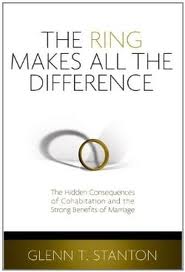Many people today operate based on the progressive belief that all things are continuously evolving into something new and better. With this mindset, they advocate for leaving behind dated practices, such as traditional marriage, and embracing new ways of life, such as cohabitation. If cohabitation is just as good, why go through all the potentially difficult societal, legal, and financial difficulties of a marriage, only to find that it does not succeed? The following video and article seek to build this case for the progressive view.
Couples who cohabitate are happier than marrieds
By Rachael Rettner (Source)
We’ve heard married people are happier, but that might not be a reason to rush to the altar, according to a new study.
In terms of health, self-esteem, and psychological well-being, marriage offers little benefit over simply living together without wedding rings, the study found.
It’s the relationship itself, rather than its official status, that’s key to its benefits, said study researcher Kelly Musick, an associate professor of policy analysis and management at Cornell University’s College of Human Ecology.
“Being in a romantic relationship, irrespective of the legal form, does provide benefits over remaining single,” Musick said.
Moreover, the findings suggest that for some, cohabitation may be the better option than marriage, Musick said. Participants who cohabited in the study were happier and had greater self-esteem than those who were married. This may be because cohabitation offers more room for independence and personal growth, which may be particularly important for some people at certain stages in life, Musick said.
The study is published in the February issue of the Journal of Marriage and Family.
Marriage vs. cohabitation
Many previous studies looking at the benefits of marriage have focused on comparing married couples with single people, or comparing married with cohabiting couples at one point in time.
The new study followed 2,737 single men and women over six years to see what happened when they entered a relationship or got married. The study data were drawn from national surveys given in the late 1980s and early 1990s.
Participants rated their overall health and happiness, and were also asked questions to assess their self -esteem, depression and the strength of their ties to friends and family.
Over the study period, close to 900 participants married or began living with a romantic partner.
In general, both marriage and cohabitation came with an uptick in well being. Those who got married or started living with a partner experienced higher levels of happiness, and lower levels of depression, than those who remained single, although these advantages faded with time.
People who married did report better overall health compared with those who cohabited, which may be explained by the entitlements (such as health insurance for spouses) that come with marriage.
However, marriage and cohabitation also reduced contact with family and friends compared to being single, and this effect lasted over time.
The researchers noted it’s been about 20 years since the surveys they used were performed, and the relative benefits of marriage versus cohabitation may have changed in recent years.
However, it’s not clear whether their findings would be more or less true today, Musick said. On the one hand, the experiences of marriage and cohabitation have become increasingly similar. But on the other hand, marriage may still hold a greater social status than cohabitation in the United States, she said.
Better off married?
The new findings are extremely valuable because they provide a clearer picture of the advantages of marriage, and counter the view that “marriage is the solution to so many of our problems” said Gary Lee, professor and chair department of sociology at Bowling Green State University in Ohio, who was not involved in the study. “I think that’s an incredibly naive view,” Lee said.
People who claim marriage brings great benefits to everyone “are kind of cherry-picking the research,” Lee said.
In reality, the people who aren’t getting married may not be doing so because it won’t make them any better off, Lee said. In today’s economic environment, marriage does not bring the same financial benefits as it used it, he said.
The researchers emphasized that “we are certainly not saying that marriage is irrelevant for individual well-being,” Musick said. For some, marriage may be a great source of happiness.
Still, the findings call into question the value of using limited resources on campaigns to promote marriage over other family forms, Musick said. More research is needed to better inform policy-makers about the advantages, or lack thereof, of such campaigns.









